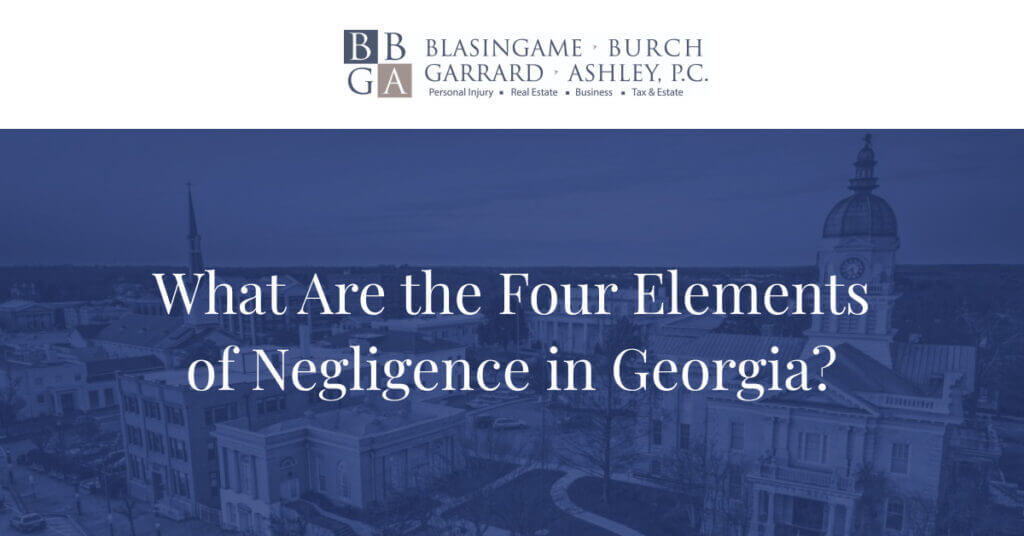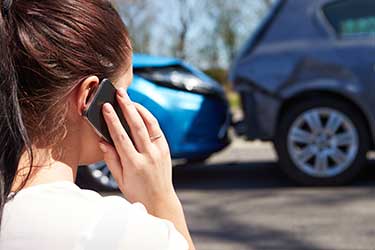
Breaking Down the 4 Elements of Negligence in Georgia
A car accident is perhaps the most common example of a negligence claim.
In most cases, these events are not “accidental.”
Instead, most of them involve the four elements of negligence. That’s especially true regarding alcohol, drugs, fatigue, and other types of driving impairment.
There are other kinds of negligence cases as well. Many people slip, fall, and are seriously injured when they are on someone else’s property. Other injuries that often involve the four elements of negligence include drug overdose cases (mostly regarding prescription pain pills), dog bites, and swimming pool drownings.
Negligence victims are usually entitled to significant compensation. That compensation includes money for economic losses, such as medical bills, along with money for noneconomic losses, such as pain and suffering. Additional punitive damages may also be available in some cases.
In addition to knowing what the elements of negligence are, an attorney must know how to prove negligence in court. The victim/plaintiff must establish the following four prongs by a preponderance of the evidence (more likely than not).
To arrange a free consultation with an experienced personal injury lawyer in Athens, please contact us online or call (706) 354-4000 today.
Contact Us
Duty of Care
When driverless cars fill the roadways sometime around 2040, they may change the world in ways we cannot understand. The last time that happened was during the Industrial Revolution in the early 1900s. That was when people began living in large cities, driving cars, and shopping in stores.
These changes gave rise to the first negligence cases. One of them was Donoghue v. Stevenson. This case gave rise to the “neighbor principle.” This rule of law was a variation of the Golden Rule (do unto others as you would have them do unto you) that many schoolchildren once had to memorize. After a few years, the “neighbor principle” became the duty of care, which is one of the four elements of a negligence case.
In most cases, duty in a negligence case involves the “reasonable person” standard. For example, in car crash cases, reasonable people obey the rules of the road and look out for other drivers. Commercial drivers usually have a higher duty of care.
This is especially true of Uber drivers, taxi drivers, bus drivers, and other commercial operators who carry passengers. Landowners may have different legal responsibilities as well, largely depending on the nature of the relationship between owner and injured guest.
Typically, duty is a question of law. The judge determines what duty, if any, applies to the facts of the negligence case.
Breach of Duty of Care

The next element in a negligence case is a fact question for the jury.
If the tortfeasor’s (negligent actor’s) conduct fell below the standard of care, the tortfeasor breached the legal duty.
Not all behavior violates the standard of care, and distracted driving is a good example.
Technically, distracted driving is any behavior that causes drivers to:
- Take their minds off the road (cognitive distraction)
- Take one hand off the wheel (manual distraction)
- Take their eyes off the road (visual distraction)
That definition encompasses a wide range of behaviors, and Georgia jurors would not consider all of them to be a breach of duty. Rolling down the window involves visual, manual, and cognitive distraction.
But if a driver rolls down a window, misses a stop sign, and collides with another vehicle, most jurors would not consider that behavior a breach of duty.
Sometimes, Georgia laws establish the standard of care. Distracted driving is also a good example of the negligence per se rule. The Peach State has a very broad distracted driving law which might apply to rolling down a window. So, in Georgia, our hypothetical tortfeasor might be legally responsible for damages in the above scenario.
Get a Free Consultation
Do you have questions about a Georgia injury claim? If so, simply submit the short form below to speak with an experienced injury attorney from BBGA about your case.
Causation
In this context, cause actually has two meanings. The tortfeasor must cause the victim/plaintiff’s damages in both the ordinary sense of the word and the legal sense of the word.
Lawyers sometimes call ordinary causation “but-for” causation. In other words, the injury would not have occurred “but for” the tortfeasor’s action or inaction. The injury can have multiple causes. That does not matter. As long as one of them is at least partially responsible for the injury, liability attaches.
There is a legal dimension as well. Proximate cause is really about foreseeability.
For example, in a car crash, it is foreseeable that a driver who loses control of a car might run onto the sidewalk and strike a pedestrian. That might or might not be likely, but it is certainly within the realm of possibility. However, if a surgeon makes a medical mistake, that injury is not foreseeable to the errant driver.
Damages
The physical injury is the final element of a negligence case. A close call or a near miss might cause significant trauma, but it is usually not actionable in a Clarke County negligence case
The physical injury usually means tangible injury. Measuring rods include medical bills, lost wages, and property damage. If the physical injury causes an intangible injury, which is often the case, these damages count as well.
Examples include:
- Loss of consortium (companionship)
- Pain and suffering
- Loss of enjoyment in life
- Emotional distress
Proving Negligence in a Personal Injury Case
One of the most complicated elements of a personal injury case is proving that the defendant’s actions were negligent.
To prove negligence, you will need to present a variety of different evidence types, including physical evidence (taking photos of the accident scene is strongly recommended), eyewitness testimony, experts’ opinions, event data recorder evidence, police reports, and more.
Comparative Negligence in Georgia
It’s important to remember that Georgia is a comparative negligence state, which means when you are suing for negligence, any fault of your own will be considered and can diminish the value of your claim.
While you will still be able to recover if you are found to be partially at fault (up to 50 percent) for your injuries, your damages will be reduced in proportion to your degree of fault.
In some states, recovery might be allowable without physical injury under a theory like negligent infliction of emotional distress. But in Georgia, victim/plaintiffs may not pursue NIED claims unless there was a physical impact or injury.
Discuss Your Case with our Personal Injury Attorney
Typically, negligence plaintiffs must prove all four elements of negligence cases.
To schedule a complimentary consultation with a seasoned personal injury attorney in Athens, reach out to Blasingame, Burch, Garrard & Ashley, P.C. Attorneys at (706) 354-4000. Our attorneys can also assist in linking victims with medical professionals, regardless of their financial situation or insurance coverage.


